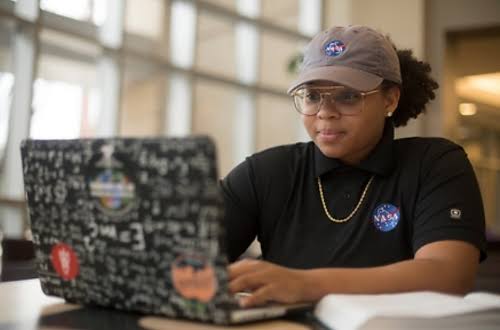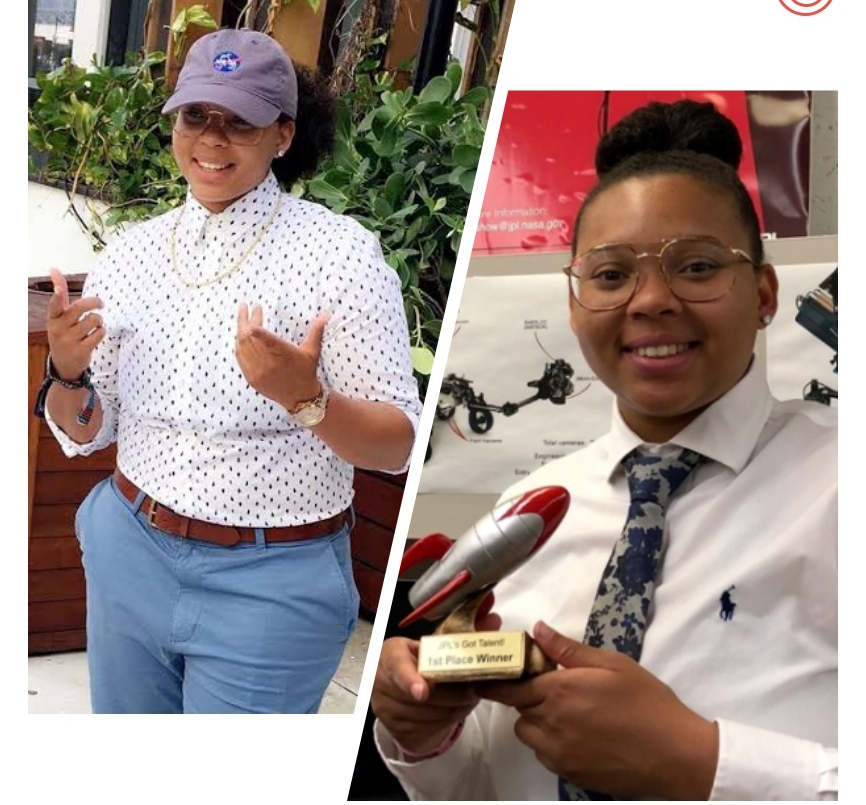Scholar. Athlete. Musician. Engineer Dajae “Moe” Williams is far from your average NASA Engineer. Not one to restrict herself to labels. Most definitely one of the most inspiring 26 year old, Dajae, a quality engineer at NASA’s Jet Propulsion Lab is constantly searching for the intersection where her passions and purpose meet, in order to live a life with infinite new experiences and broken barriers.
“I create music that fuses hip-hop and math as a tool to encourage underprivileged youth to explore STEM” the rocket scientist says.
Amazingly, Dajae using music as a powerful tool has been able to translate difficult math and science theories into easy to remember, and catchy, hip-hop lyrics which has warmed hearts of teachers, students, and even her coworkers who can’t get enough of her music.
Don’t get it twisted, her journey towards her destined career path started off unintentionally after being enrolled in an honors math class by mistake. Initially earning her way to college through full ride Basketball Scholarship, her goal was to play professionally, but it all changed after just one year of college basketball. Dajae had discovered the world of Science, Technology, engineering, and mathematics.
Passion met an opportunity of a lifetime, an internship at Anheuser-Busch. Dajae had to leave her scholarship. After the internship, she couldn’t afford to return to Missouri S&T so she decided to return to basketball for the local college, St. Louis Community College. It would prove to be the best decision ever, she began focusing less on basketball and more on her studies, almost immediately, the internships started rolling in. First John Deere, then Toyota, ultimately paving way for Dajae to return to Missouri S&T.
Now, the native of St. Louis currently residing in Los Angeles works with NASA as a rocket scientist, but more than that, she using her passion and experience to bring math and science using music to youths of color.
“Sometimes I still have to pinch myself,” she told reporters. “It’s always an exhilarating experience being around so many smart people, just being present, and taking it all in because there is so much to learn.”

The quality engineer at NASA’s Jet Propulsion Lab is one of the few Black people and one of the youngest to work at the research facility.
“Look, there are some pretty dope people that I work with across all of the NASA campuses, but I’m pretty sure that I’m the dopest,” Williams told St. Louis Public Radio.
Speaking and sharing her story with the Science Teachers Association of Texas, she discussed challenges encountered growing up as one of the few Black people in a school district and how the lack of cultural awareness caused greatly affected communication between her teachers and herself.
“Sometimes education can be, at least in math and science, it can be a very traumatic experience…especially for kids of color. We’re not necessarily taught in the language that we learned growing up,” she explained to St. Louis Public Radio as to why she enjoys working with children. “Your teachers don’t look like you, they don’t understand where you’re coming from. So I’ve seen some pretty traumatic things, and I also have experienced some trauma myself in education, so to see the kids dancing and laughing when it comes to education…that is honestly what brings me joy.”
While in High school, she began using music to get by, it became a thing while studying at Missouri University of Science and Technology in Rolla where she was studying engineering management – industrial engineering, there she perfected her rap. While schooling there, she took Soulja Boy Tell’em’s popular “Crank That” beat and added lyrics on how to solve the quadratic equation, which went viral on social media.
Williams’ first love was music, she wanted to be a producer, but after seeing how well she did in math while in high school her mom encouraged her to try the STEM field due to its lack of gender and racial representation.
“My mom convinced me to go into a STEM field,” she said. “She saw that I was getting good at math and science, so she was like, ‘Why don’t you explore this. There’s not a lot of women. There’s not a lot of black people in this field. See what you can do. See if you can make a change.’”
Her mothers motivation worked out for her in the end because now she’s able to use both her passions to make a difference. She worked on the team that helped build the ground support equipment for Sentinel-6, which is the first in a series of spacecraft that launched this past weekend to monitor our oceans. Now that she’s reached one of her dreams she pushes others to reach for the moon because they just may land in the stars, Because of Them We Can reports.
“Put yourself out there. Apply for things that you don’t think you qualify for. Take classes that you don’t think you’re smart enough for. It will take you further than you realize.”
When she isn’t producing music, you can find her creating solutions as a manufacturing engineer at NASA’s Jet Propulsion Laboratory.



